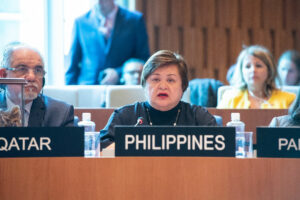By Kenneth Christiane L. Basilio, Reporter
THE Department of Foreign Affairs (DFA) is taking a “strategic, deliberate and calibrated approach” amid calls for the Philippines to file a United Nations General Assembly (UNGA) resolution on the South China Sea, Manila’s top envoy said on Tuesday.
Foreign Affairs Secretary Ma. Theresa P. Lazaro said the DFA is studying the possibility of a UNGA resolution on Chinese activities in the contested waters but emphasized the agency’s priority is securing a seat at the UN Security Council.
“The Department of Foreign Affairs is looking at a strategic, deliberate and calibrated approach, and this is what we need to promote the resolution that you have mentioned,” she told lawmakers at a congressional hearing. “We are consulting the mission in New York on the possibilities and the probabilities of having this resolution passed.”
“We’re looking at it and we’re studying it very carefully,” she added.
Congressmen in late-August urged the DFA to raise concerns on Chinese activities in the South China Sea before the UN General Assembly, as they pressed China to cease what was described as its “hostile and aggressive” actions in the waterbody.
The Chinese Embassy in Manila did not immediately reply to a Viber message seeking comment.
China claims almost the entire South China Sea under its controversial nine-dash line, overlapping with the claims of the Philippines, Vietnam, Malaysia and Brunei.
In 2016, the Permanent Court of Arbitration in The Hague ruled in favor of the Philippines, voiding China’s sweeping claims over the contested waters. Beijing has refused to recognize the ruling and maintains a heavy presence in disputed areas, including the Spratly Islands and Scarborough Shoal.
Filing a UNGA resolution on the South China Sea could help ease tensions in the disputed waters, said Ms. Lazaro. “There is the possibility it may.”
But she said the Philippines remains keen on using its bilateral consultation mechanism with China as a channel to raise concerns and help ease tensions in the South China Sea.
“[It] is so far being effective,” she said.
The bilateral consultation mechanism was established in 2017 amid disputes in the waters, where trillions worth of shipborne trade passes through annually.
“Raising and putting an emphasis on our ongoing quest to promote our sovereignty and territorial integrity over the disputed waters in the UN General Assembly will undoubtedly be a strategic move,” Josue Raphael J. Cortez, a diplomacy instructor at De La Salle-College of St. Benilde’s School of Diplomacy and Governance, said in a Facebook Messenger chat.
“Opening such discussion, although it would not bode well with China, may allow us to rally more support from like-minded nations,” he added.
He said such a resolution could highlight the Philippines role as a “norm-setter” in the disputed waters and could help generate support for the approval of the stalled Code of Conduct in the South China Sea.
The Association of Southeast Asian Nations (ASEAN) and China pledged in 2002 to come up with a code of conduct in the waterway, a framework that seeks to prevent conflict through diplomatic means but it has remained elusive due to slow progress.
“[It] may also serve as an impetus for global backing on the Code of Conduct that we wish to promote during our Association of Southeast Asian Nations chairship,” he said.
Raising the South China Sea dispute at the UN General Assembly may also help bolster support for the Philippines’ campaign for a seat on the UN Security Council, he added.
“It would be very unlikely that raising the issue would negatively affect our campaign,” he said.
The Philippines is seeking a nonpermanent seat on the UN Security Council, with elections set for June next year, said Ms. Lazaro. “The focus… now is to gather more support because of our UN Security Council candidature.”
Securing a seat on the UN Security Council could strengthen the country’s ability to raise immediate security concerns, including the South China Sea, Hansley A. Juliano, a political science lecturer at the Ateneo de Manila University, said in a Facebook chat.
China is among the five permanent members of the Council, alongside, France, Russian Federation, the United Kingdom, and the United States.

